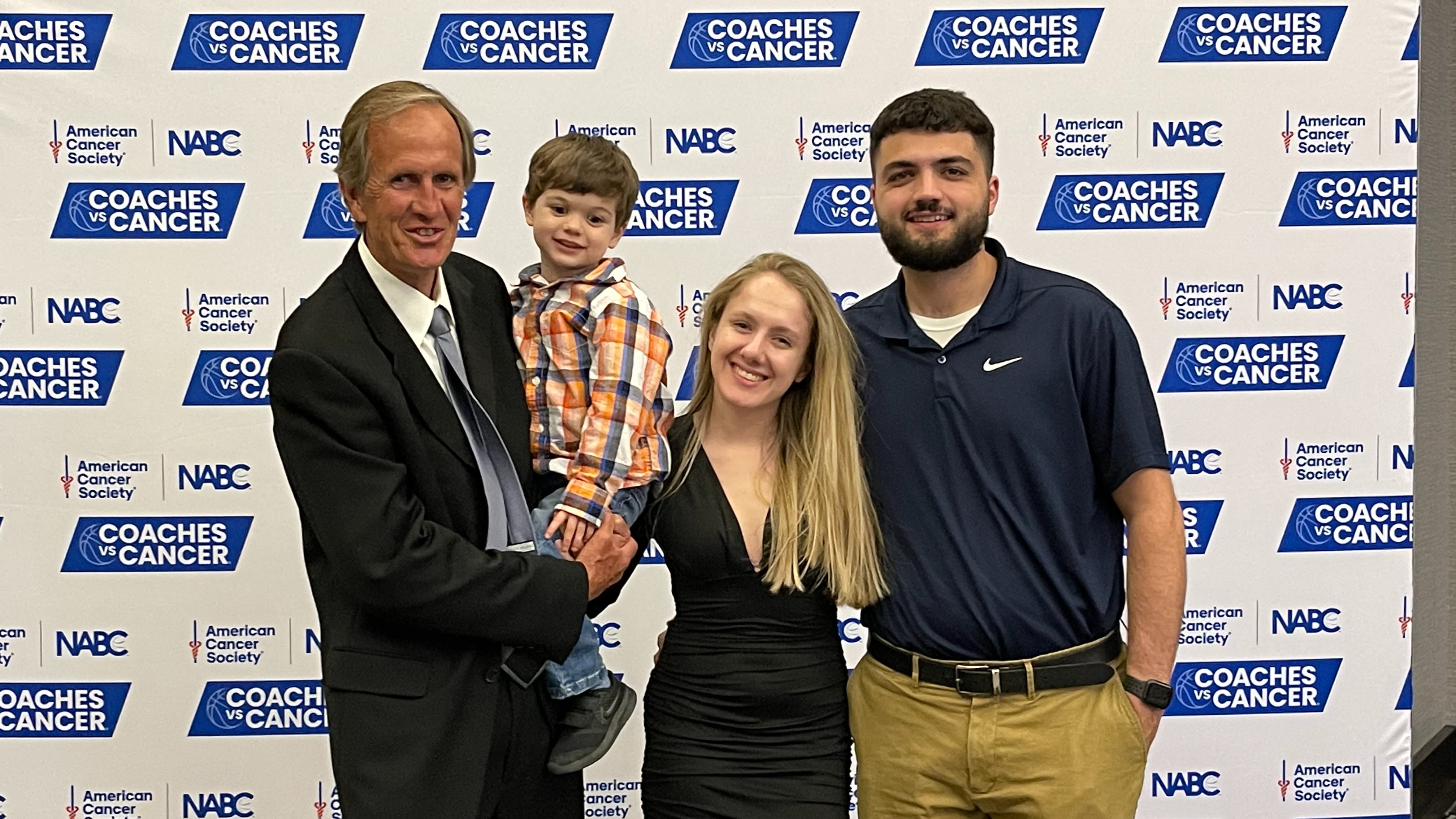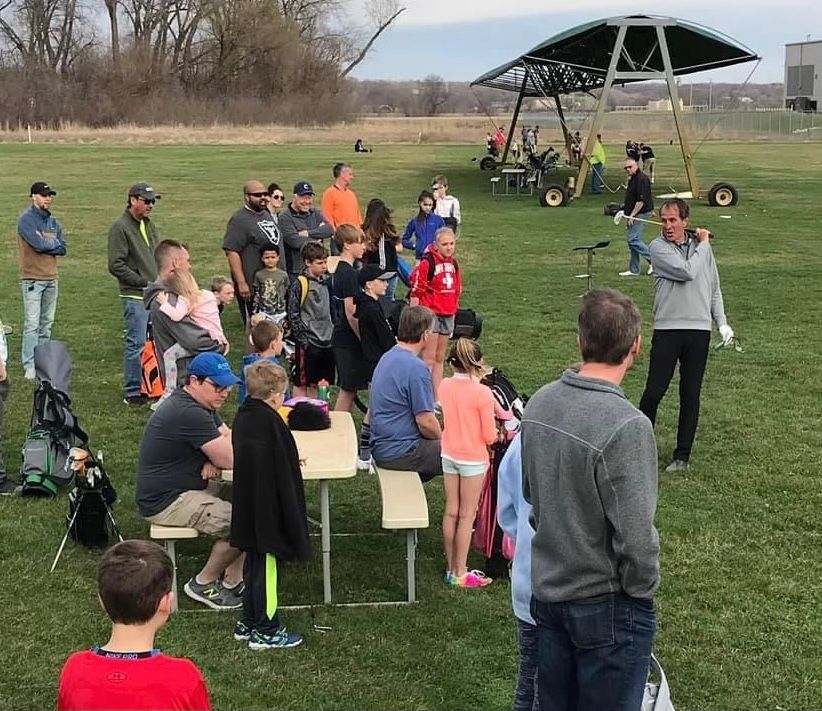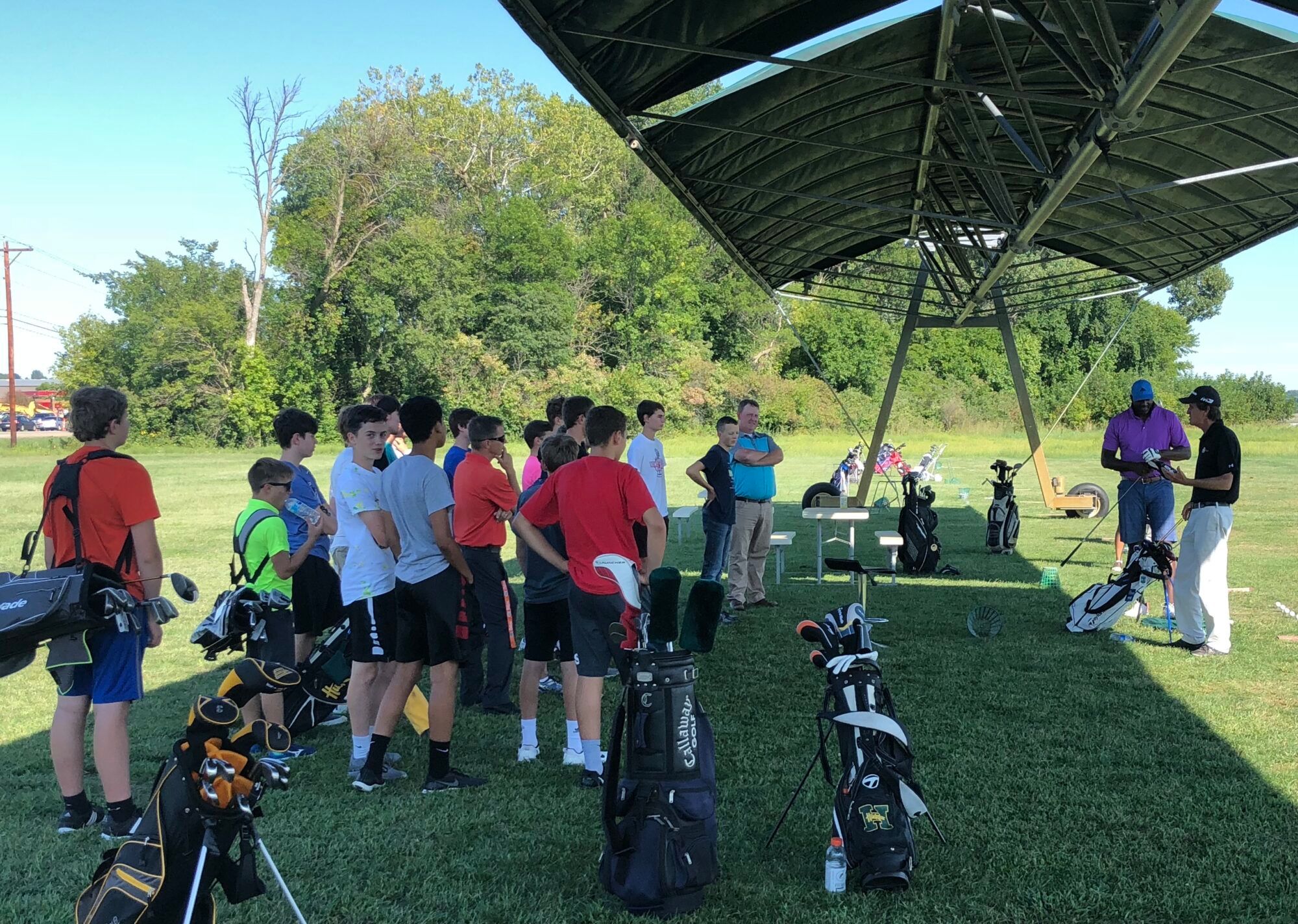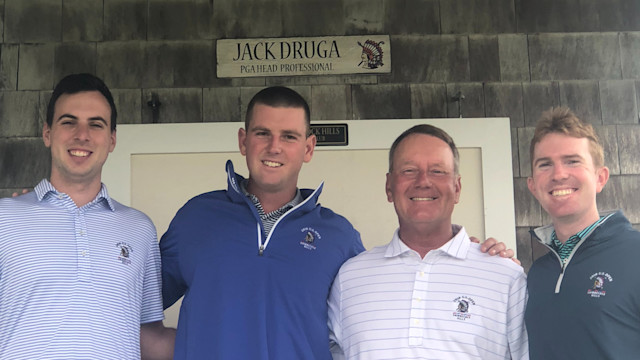Game Changers
Overcoming the Bleakness of a Rare Disease, Mark Egly, PGA, Has Become an Iowa Coaching Legend
By Vinnie Manginelli, PGA
Published on

Mark Egly (far left) with his family.
For most individuals, sustaining three no-fault car accidents in 25 years is a physical challenge that few can overcome.
In Mark Egly’s case, this unfortunate statistic has become more of a footnote in his life rather than a headline. He’s always been curious about his genes and the suspect health of the generations that came before him, and what he’d discover through his extensive research would benefit many people he doesn’t even know.
Egly is the owner of Des Moines Driving Range in Des Moines, Iowa. The PGA of America Golf Professional started in the golf industry in 1979 as an instructor at Des Moines Golf & Country Club. He’d develop and grow as a PGA Professional over the next 15 years before opening his golf practice facility in 1994.

Egly coaching at the Des Moines Driving Range.
As Egly celebrates three decades in business next year, he reflects upon the physical hardships he’s sustained in his health. The three car accidents he endured between 1990 and 2015 caused fractures and nerve damage in his neck, back, spine, and right arm, and he’s had a knee operation that he calls “easy” compared to the rest of the afflictions he’s dealt with.
“It meant learning to live with pain,” Egly admits.
But, he’d soon discover a more serious issue in an extraordinary finding.
It was 2018, and Egly had been suffering for many years with considerable coughing and breathing issues, and had pain and inflammation from his injuries that would last longer than normal. He received a doctor’s diagnosis of emphysema and chronic obstructive pulmonary disease (COPD).

After doctors confirmed, Egly shared his medical findings with the local Des Moines news in hopes to help others.
As a lifelong athlete and non-smoker, Egly found this result hard to accept. It was just a few days later that he’d self-diagnose his ailment as Alpha1 Antitrypsin Deficiency, a genetic disorder involving the SERPINA1 gene. According to his foundation’s website, Alpha1 Antitrypsin Deficiency is “a genetic situation where the SERPINA1 gene does not allow the body to make enough Alpha1 Antitrypsin to protect the body adequately from excess neutrophils or the person has improperly unfolded Alpha1 Antitrypsin from the liver. This improper unfolding causes potential liver damage and lowers the amount of Alpha1 Antitrypsin capable of protecting the body and its tissue to the best of its ability.”
Doctors would soon confirm his hypothesis.
A kinesiology major at Michigan State University, Egly always wondered why he lost three of his four grandparents at dramatically early ages. What was in their genes that caused the early demise of his loved ones? He conducted extensive research and created the Mark Egly Foundation to spread the word on the treatment of Alpha1 Antitrypsin Deficiency. When he was faced with the dilemma of accepting a doctor’s questionable diagnosis or taking steps of his own, he discovered that taking the Alpha1 Antitrypsin protein, a body’s natural pain reliever, would reduce the symptoms of the deficiency. He started this regimen in April of 2018.
By December of that year, he was beckoned to the University of Iowa Hospital, where doctors told him of a growth on the wall of his pancreas, and ominously gave him a 30 percent chance of living six months. Egly believes his weekly regimen of Alpha1 Antitrypsin has been one of the main factors in his bucking those odds and living an otherwise productive life five years later.
At the time of Egly's discovery, there were roughly 8,000 confirmed cases of Alpha1 Antitrypsin Deficiency and little was known about the disease. His foundation “has become dedicated to the world's education on many diseases and the prevention and treatment of multiple diseases and conditions."

Even through health challenges, Egly finds little moments of joy, like skating with his grandson.
Egly even has a United States patent that “relates generally to a method of treating a plurality of diseases with Alpha1 Antitrypsin, and in particular to methods for diagnosing, preventing and treating with Alpha1 Antitrypsin, diseases and conditions caused by excessive neutrophils, neutrophil elastase, neutrophil extracellular traps, inflammation and/or oxidative stress.”
Through his lobbying with local, state and national officeholders, Egly strives for legislation that would help produce Alpha1 Antitrypsin and lessen the need for blood donors to carry the full load. He says it takes 900 blood donors a year to provide the Alpha1 Antitrypsin regimen that he requires.
Egly's health challenges haven't slowed his golf career one bit, though. He's earned seven Iowa PGA Teacher & Coach of the Year Awards, a Professional Development Award, four Player Development Awards, and most recently, the 2022 Deacon Palmer Award, which “bestows recognition on a PGA of America Golf Professional who personally displays outstanding integrity, character, and leadership, in the effort to overcome a major obstacle in their life.” He is a finalist for the 2024 PGA of America National Deacon Palmer Award, with the recipient being announced at next month's PGA Show.

Today, Egly’s driving range is thriving with golfers from before COVID-19 and others who have discovered the great game as a result of the pandemic. With real grass tees, short game and putting areas, and player development programming for adults and juniors, Des Moines Driving Range is often the first experience a new golfer has in the game, and Egly offers a plethora of reasons to come back time and time again.
“I teach golf to people differently than others because of my medical background,” Egly says. “I’ve had to know the physics, the motions of the human body, and how to prevent injuries and maximize performance.”
Egly has had some very successful students over his many years in the game, including Sean McCarty, a 2019 inductee in the Iowa Golf Association Hall of Fame, who participated in three major championships and at the age of 45 had the fastest registered clubhead speed on the PGA TOUR.
Egly says he has been blessed and has benefitted from being a PGA of America Golf Professional. Being outdoors in the sun, playing the game competitively, and working at his range have provided the natural Vitamin D and oxygen that have helped him handle his disease better than many others who may lead more sedentary lifestyles.
He works 15 hours a day, seven days a week, and is thankful every day for being an active golf coach, mentor and PGA Member.



